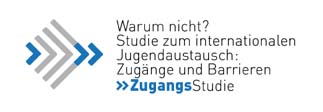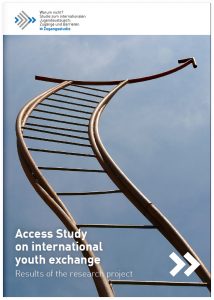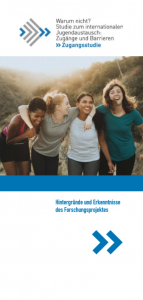The research project: access study
Between 2016 and 2018, the network “research and practice in dialogue” initiated and coordinated a research project to collect data regarding the access and participation of young people in international youth exchange programs. This study has been funded by the Federal Ministry for Family Affairs, Senior Citizens, Women and Youth (BMFSFJ) and the Robert Bosch foundation.
Four research institutes implemented the study “Why not? Study of International Youth Exchange Programs: Access and Barriers” conjointly:
- SINUS Institut
- IKO (Insitut für Kooperationsmanagement)
- Forschungsverbund Freizeitevaluation,
- University of Applied Sciences Köln
Each of the four research institutes conducted a part of the research, focusing on different but complementary perspectives. In an interdisciplinary approach, qualitative, quantitative as well as mixed-methods have been used.
The outcomes of each partial study were then put into perspective in order to highlight and identify the issues concerning accessibility of young people in Germany to international exchange programs.
Main findings
Brochure
The brochure “Access Study on international youth exchange. Results of the research project” sums up the main findings and contains resonances from the projects advisory board.
Flyer
The flyer gives a brief abstract of the main findings and conclusions.
Follow Up: access study+ (2019-2020)
The follow up project “access study +” (2019-2020) aims to enable more young people to participate in international youth exchanges by spreading the findings of the study and gathering international perspectives on the topic. Therefore, six national and four international conferences were held.
Talking the national conferences, the research results were presented to different groups of local practitioners. Accounting for the specifics of the regional structure and practice of international youth work, researchers and practitioners discussed the findings, aiming to identify next steps in the region. The national conferences took place in the following cities, cooperating with the following partners:
- Halle a.d. Saale (GOEUROPE! and Jugendsozialwerk Nordhausen e.V.)
- Nuremberg (Bavarian Youth Council)
- Hanover (State Youth Welfare Office Lower Saxony)
- Düsseldorf (aktuelles forum e.V.)
- Schwerin (Ministry of Social Affairs, Integration and Gender Equality Mecklenburg-Western Pomerania und Regional Youth Council Mecklenburg-Western Pomerania)
- Stuttgart (Jugendstiftung Baden-Württemberg
Since the findings accounted for the German context only but raised interest on a broader European scale, four international conferences were held, both to enrich the discourse about access to and obstacles of international youth exchanges and to take the issue on a European level. The conferences took place in the countries as followed:
- Poland (German-Polish Youth Office)
- France (Franco-German Youth Office)
- Albania (Regional Youth Cooperation Office)
- Finland (Marttinen Youth Center)
The network „Research an Practice in Dialogue – International Youth Work“ (RPD)RPD has been founded in 1989 and is an interdisciplinary network active at the national level. The network is coordinated by transfer e.V. On the part of academia several universities and universities of applied sciences are part of the network. Different subjects, fields of research and methodological approaches are integrated. The part of practice is represented by several youth associations and institutions active at a regional and local level as well as umbrella associations like the International Youth Service of the Federal Republic of Germany (IJAB). Financing bodies, local administration and departments complement the network, which is funded by the Federal Ministry for Family Affairs, Senior Citizens, Women and Youth (BMFSFJ). |



